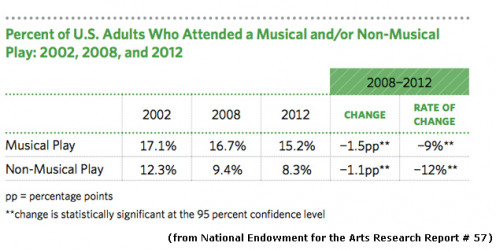Is Nonprofit Theatre A Fatally Flawed Business Model?
Based on my recent inside view of an employment nightmare involving a particular nonprofit theatre, I now question the logic of the entire nonprofit theatre business model.

Who Cares About Live Theatre
According to Craig Lambert (2012), The Future of Theater, HARVARD MAGAZINE
http://harvardmagazine.com/2012/01/the-future-of-theater
- Live theater now faces unprecedented challenges in a rapidly evolving society, where young people value electronic and digital technologies above traditional media.
- In 2009-2010, the average Broadway theatergoer was 48 years old.
- Entertainment on a laptop or handheld device is cheaper and more convenient for both young and old alike.
- The people who are willing to invest in regional, live theatrical productions (off-Broadway and beyond) are disappearing.
From an annual report by Americans for the Arts, Roland J. Kushner & Randy Cohen (2013). National Arts Index 2013: An Annual Measurement Of The Vitality Of Arts And Culture In The United States
http://www.artsindexusa.org/wp-content/uploads/2013/09/2013-NAI-Full-Report.pdf
- Approximately 10% of Americans attend one or more live theatrical performances in a year. This means that most Americans (90%) NEVER attend a live theatrical performance.
Referring to the largest and most reliable survey on how Americans engage with the arts, conducted by the U.S. Census Bureau, in association with the National Endowment For The Arts (2013), How A Nation Engages With Art: Highlights From The 2012 Survey Of Public Participation In The Arts (SPPA), NEA RESEARCH REPORT #57 ... http://arts.gov/sites/default/files/highlights-from-2012-SPPA-rev.pdf
- In 2012, 15.2% of adults (eighteen and older) nationwide attended at least one musical play (compared to 17.1% in 2002) – a 9% DECLINE in one decade.
- In 2012, 8.3% of adults (eighteen and older) nationwide, attended at least one non-musical play (compared to 12.3% in 2002) – a 12% DECLINE in one decade.
- The decline in musical play attendance marks the first statistically significant change in this activity since 1985.
- Non-musical play attendance has dropped at a 33% rate over the last decade (2002-2012.
What This Means About The Value Of Live Theatre
The percentage of people in America who attend live theatrical performances has been small (approximately 10%) for at least the past decade (from 2002-2012). This small percentage of live theatregoers appears to be shrinking even more (for years 2013 and beyond). Such an observation leads to an unavoidable conclusion:
Very few people in America today place any value on live theatre.
Does this mean that live theatre lacks deeper values? No. This means that live theatre might very well embody human values above a beyond what most people are willing to pay dollars to foster.
Unfortunately, this also means that live theatre as a business model appears to be a failing proposition, especially today. Why? – If only10% of the population is willing to pay money for a product or service, then any business that sells such a product or service has an extremely small paying market, where competition for that paying market is extremely fierce.
Compare live theatregoers' 10% to:
- 68% of the American/Canadian population that pay to attend at least one movie film in a year (http://www.mpaa.org/wp-content/uploads/2014/03/2012-Theatrical-Market-Statistics-Report.pdf)
- 71% of American households that pay for internet service (http://www.huffingtonpost.com/2012/10/31/internet-access-american-households_n_2049123.html)
- 90% of Americans who pay to own a cell phone (http://www.huffingtonpost.com/2012/10/31/internet-access-american-households_n_2049123.html)
- 96% of Americans who pay to eat at a fast food restaurant (http://www.gallup.com/poll/163868/fast-food-major-part-diet.aspx)
In a business sector, therefore, where sales of a product or service struggles to pay to operate the business, continual begging for the remaining operating capital becomes tiring to potential funders who hear the same old story about economic struggle for a noble cause.
Nonprofit theatres continually risk exhausting the good wills of their audiences. A particular nonprofit theatre, thus, might have a good run for a few years, and then it dies with the enthusiasm of critical donors who feel too drained to support it financially any longer. Such might well be the NATURAL life cycle of any one nonprofit theatre business.
The overriding conclusion to draw from all this, then, seems to be that only very few, SUCCESSFUL live theatre BUSINESSES can actually exist at any one moment in the current era.

What This Means About Who Live Theatre Benefits The Most
If live theatre businesses depend heavily on begging for money to supplement what sales of their products or services cannot generate for operating costs, then who really benefits most economically from their existences? I dare say that paid officers benefit the most, as these leaders of nonprofit theatres receive wages or salaries for as long as their begging brings in sufficient funds to keep their organizations afloat.
The live theatre cause might be noble, but those people who really benefit from preaching and practicing this noble cause are the people who receive paychecks consistently to do so.

Live theatres, thus, appear to present substantial, although fragile, employment opportunities for a few artistic leaders who maintain antiquated connections to certain human values that the whole of American society does not share. Meanwhile, only a very few other people buy into the founding ideals to pay these leaders. A small community might also enjoy a few plays. A few interns might continue to sculpt hopes that have little bases for economic support in today's world. A few other people might enjoy a brief period of spinning their wheels under a spell of doing something socially elevated, simply because this is how people have always done it (via a love of antique methods to sustain an antique enterprise).
But is this the most noble business model? I think not.








